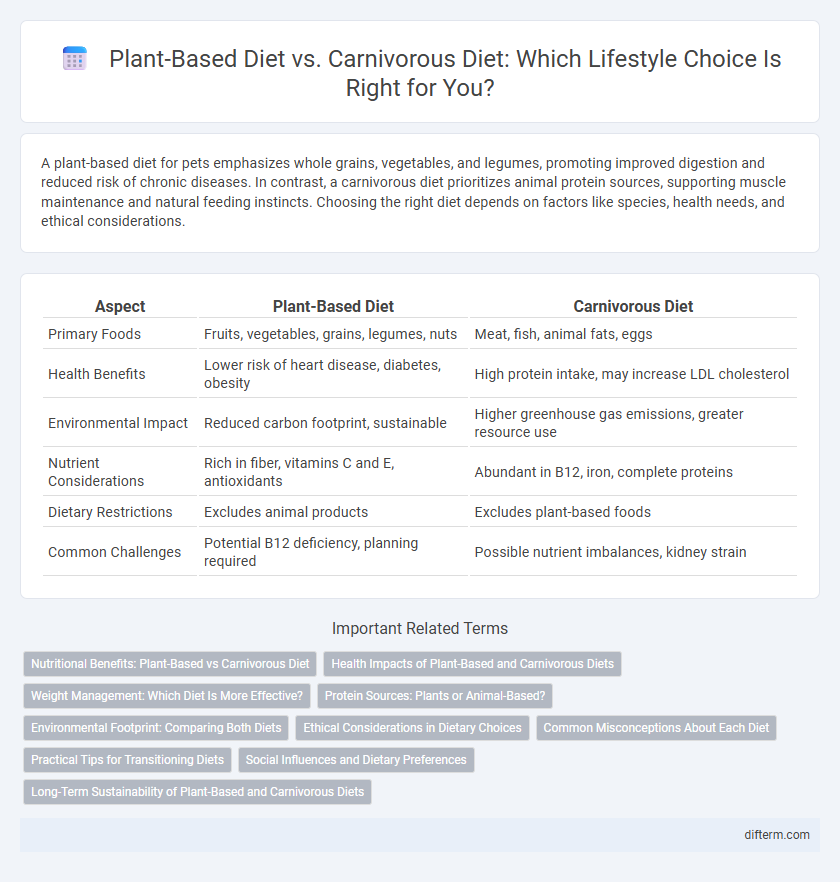A plant-based diet for pets emphasizes whole grains, vegetables, and legumes, promoting improved digestion and reduced risk of chronic diseases. In contrast, a carnivorous diet prioritizes animal protein sources, supporting muscle maintenance and natural feeding instincts. Choosing the right diet depends on factors like species, health needs, and ethical considerations.
Table of Comparison
| Aspect | Plant-Based Diet | Carnivorous Diet |
|---|---|---|
| Primary Foods | Fruits, vegetables, grains, legumes, nuts | Meat, fish, animal fats, eggs |
| Health Benefits | Lower risk of heart disease, diabetes, obesity | High protein intake, may increase LDL cholesterol |
| Environmental Impact | Reduced carbon footprint, sustainable | Higher greenhouse gas emissions, greater resource use |
| Nutrient Considerations | Rich in fiber, vitamins C and E, antioxidants | Abundant in B12, iron, complete proteins |
| Dietary Restrictions | Excludes animal products | Excludes plant-based foods |
| Common Challenges | Potential B12 deficiency, planning required | Possible nutrient imbalances, kidney strain |
Nutritional Benefits: Plant-Based vs Carnivorous Diet
Plant-based diets are rich in fiber, antioxidants, vitamins, and minerals, which support heart health, reduce inflammation, and aid digestion, while typically containing lower levels of saturated fat and cholesterol compared to carnivorous diets. Carnivorous diets provide high-quality protein, essential amino acids, and bioavailable nutrients such as vitamin B12, iron, and zinc, crucial for muscle maintenance and metabolic functions. Balancing nutrient intake by combining plant-based foods with selective animal products can optimize overall health and nutritional benefits.
Health Impacts of Plant-Based and Carnivorous Diets
Plant-based diets rich in vegetables, fruits, whole grains, and legumes are associated with lower risks of cardiovascular disease, hypertension, type 2 diabetes, and certain cancers due to high fiber, antioxidants, and phytonutrients. Carnivorous diets, emphasizing animal proteins and fats, may elevate cholesterol levels and risk of heart disease but can benefit muscle mass and nutrient bioavailability such as heme iron and vitamin B12. Long-term health outcomes depend on diet quality, micronutrient balance, and individual metabolic responses.
Weight Management: Which Diet Is More Effective?
Plant-based diets are often more effective for weight management due to their high fiber content and lower calorie density, which promote satiety and reduce overall caloric intake. Carnivorous diets, rich in protein and fats, can support muscle retention but may increase calorie consumption and limit nutrient diversity. Research consistently shows that plant-based eating patterns contribute to greater weight loss and better metabolic health outcomes compared to exclusively meat-based diets.
Protein Sources: Plants or Animal-Based?
Plant-based diets rely on protein sources such as legumes, tofu, tempeh, and quinoa, which provide essential amino acids while being low in saturated fat and cholesterol. In contrast, carnivorous diets offer complete proteins from animal-based foods like meat, fish, dairy, and eggs, which are rich in bioavailable nutrients such as vitamin B12 and heme iron. Understanding the differences in protein bioavailability, nutrient density, and health impacts is crucial when choosing between plant and animal-based diets.
Environmental Footprint: Comparing Both Diets
A plant-based diet significantly reduces environmental footprint by lowering greenhouse gas emissions, conserving water, and minimizing land use compared to a carnivorous diet. Livestock farming accounts for approximately 14.5% of global greenhouse gases, whereas plant-based food production emits substantially less carbon dioxide. Transitioning to plant-based diets can lead to sustainable resource management and mitigate climate change impacts effectively.
Ethical Considerations in Dietary Choices
Plant-based diets prioritize animal welfare by minimizing harm and exploitation, aligning with ethical principles of compassion and sustainability. Carnivorous diets raise concerns about factory farming, environmental degradation, and animal rights violations due to increased demand for meat production. Choosing a plant-based diet supports ethical considerations by reducing the ecological footprint and promoting humane treatment of animals.
Common Misconceptions About Each Diet
Plant-based diets are often misunderstood as lacking sufficient protein and essential nutrients, yet they can provide complete nutrition through diverse sources like legumes, nuts, and fortified foods. Carnivorous diets are frequently perceived to guarantee superior muscle gain, though excessive animal protein intake may increase risks of heart disease and nutrient imbalances. Positive health outcomes depend more on nutrient quality and balance than exclusive adherence to either plant-based or carnivorous eating patterns.
Practical Tips for Transitioning Diets
Incorporate gradual changes by replacing one meal per day with plant-based alternatives to ease the transition from a carnivorous diet. Prioritize nutrient-dense foods like legumes, whole grains, and leafy greens to maintain balanced nutrition and prevent deficiencies. Utilize meal planning apps and consult with nutritionists to tailor a sustainable diet that supports energy levels and overall health during the adjustment period.
Social Influences and Dietary Preferences
Social influences significantly shape dietary preferences, with plant-based diets often promoted within health-conscious and environmentally aware communities, encouraging adoption through social networks and media. Carnivorous diets, rooted in traditional and cultural practices, appeal to social groups valuing protein intake and meat-centric meals, reinforcing preferences through family habits and societal norms. Understanding these dynamics helps tailor nutrition guidance to align with personal values and social contexts.
Long-Term Sustainability of Plant-Based and Carnivorous Diets
Plant-based diets promote long-term sustainability by reducing environmental impact through lower greenhouse gas emissions, conserving water, and preserving biodiversity compared to carnivorous diets. Carnivorous diets typically demand higher resource consumption and contribute significantly to deforestation and habitat loss, challenging their sustainability. Adopting plant-based nutrition supports sustainable food systems and mitigates climate change effects over time.
plant-based diet vs carnivorous diet Infographic

 difterm.com
difterm.com